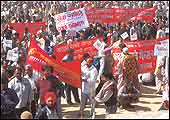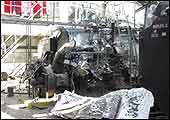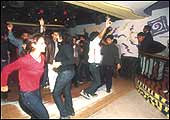








|
TRENDS: TRENDS 2001
TARIFFS AND TAXES: The
government went into a tax rationalisation overdrive in 2001. Excise
duties were rationalised into three rates (8, 16 and 24 per cent), and the
10 per cent surcharge on Customs duty was scrapped. Even a two-tier VAT
(value added tax) was promised for 2002.
-Swati
Prasad
 |
| Pramod
Mahajan: unravelling the tangle |
TELECOM: It
was in tangles. It started with the then telecom minister Ram Vilas Paswan
announcing in January that the government would allow basic telecom
operators to deploy Wireless in Local Loop (will), which would allow them
to offer limited mobility services. Predictably, cellular service
providers were up in arms. In the dogfight that has ensued, the sector is
now a lawyer's paradise, with basic operators fighting cellular operators
and both in turn ganging up against BSNL (the erstwhile operational arm of
dot). All of them together are lobbying with the Telecom Regulatory
Authority of India (TRAI) to protect their respective interests.
The industry squabble claimed Paswan's job,
and Pramod Mahajan was brought in. Mahajan promptly merged the
communication and it ministries. On the disinvestment front, VSNL sale
continued to hang fire, even as the government milked it for dividends.
Finally, as the nation awaited for private
players in domestic and international telephony, Internet Service
Providers (ISP) seemed set to enter the business using the Voice over
Internet Protocol (VOIP) technology, by paying the mandatory entry fee of
Rs 25 crore. Not an easy business this.
-Ashutosh
Sinha
|

|
| Sandeep
Goyal: a failed reprogramming attempt |
TELEVISION: The
year saw Star Television emerging on top, primarily at the expense of
rivals Sony Entertainment Television (SET) and Zee Television. Zee did try
to re-launch its entire channel, but flopped miserably. Tongues wagged,
the buck got passed and ultimately quite a few heads rolled both at Zee
and SET. On the news front, Aaj Tak, the 24-hour Hindi news channel from
the India Today Group stable (which also owns Business Today) became the
number one news channel scoring over Zee News and Star News.
The imbroglio over TRPs, triggered by the
leak of the sample-householdsforced the merger of tam and INTAM.
Meanwhile, Zee pushed its five-language Alpha bouquet and Star picked up a
majority stake in Tamil channel, Vijay. And the year ended with lots of
buzz over Subhash Chandra apparently trying to offload a 26 per cent stake
in Zee to AOL-Time Warner. Zee announced the formation of a distribution
joint venture with Turner (India), Zee Turner Private, but the buzz
refuses to die.
-Shailesh
Dobhal
 |
| Such
pictures could soon belong to the past |
UNIONS: Lal
Bahadur Singh has plenty of time on his hands. A general secretary with
INTUC (Indian National Trade Union Congress), Singh is fast becoming a
part of a dying breed-a trade unionist. And, if the affairs at Singh's
home state, West Bengal, are any indication then the coming years could
well see trade unions move from a confrontationist approach to a
cooperative one. There have been no strikes in West Bengal and Kerala,
both traditionally hot-houses of trade unionism, in the past six months.
Even the disinvestment of state-owned enterprises hasn't prompted unions
to see red.
''We realise the need for industry to do
well,'' says Chittabrata Mazumdar, General Secretary, CITU, which has for
long been the most obdurate of trade union organisations. Mazumdar has
little option. The leader of the party he belongs to, and the chief
minister of West Bengal, Buddhadeb Bhattacharya, has made it clear that
strikes are just not on. Even the late Datta Samant's Marathi Kamgar Union
and the INTUC echo Mazumdar's sentiments.
''We have seen the damage militant trade
unionism had caused in the previous years,'' says INTUC president Subrata
Mukherjee. Adds S.K. Benjamin, the President of the workers' union in Tata
Iron and Steel Co: ''For the last 50 years we have been partnering the
management. And that is the new mantra for all trade union activity across
the country.''
-Debojyoti
Chatterjee
|

|
| K.V. Kamath:
univ-bank blues |
UNIVERSAL BANKING: The
finance sectors buzzphrase-of-choice for 2001 was 'universal banking'. In
April 2001, the RBI provided a framework for financial institutions to
convert themselves into universal banks. Then, in October 2001, while
presenting the mid-term review of the monetary and credit policy for
2001-2, RBI Governor Bimal Jalan promised to process applications
promptly. It makes sense for FIs to repurpose themselves-the original
developmental objective they were set up for isn't really relevant at a
time when companies have easy access to capital. And the conversion, one
school of thought goes, will impose more stringent provisioning norms on
them, thereby, adopting a prophylactic route to solving the malaise of Non
Performing Assets that has traditionally plagued FIs.
ICICI was the first to submit an application
to RBI (on October 25, 2001) and got an in-principle clearance this month
to become an universal bank through a reverse merger with ICICI Bank. The
Industrial Development Bank of India (IDBI), which has sought a bail-out
package from the government in the wake of a messy NPA problem has also
submitted its proposal and will soon announce the bank with which it will
merge.
-Roshni
Jayakar
 |
| Subramanyam:
what a mess! |
US-64:
For the first time in its 37-year history, the flagship fund of the Unit
Trust of India announced a freeze on trading in July 2001 when its
reserves turned negative. The Trust's chairman at the time, P.S.
Subramanyam, blamed the bear market and corporate investors who
providentially exited the scheme before the freeze. It later turned out
that under PSS, UTI had simply mirrored the actions of a bull-coterie. Its
dubious investments had caused a precipitous fall in its NAV (now Rs
8.50). Current Chairman M. Damodaran has a year to clean things up at UTI,
and he seems to be doing alright.
-Roshni
Jayakar
VC: Downsize,
right-size, economise. They rhyme, and they were the mantras of choice in
the VC domain in 2001. As funds available to venture capitalists became
scarcer-less than 30 per cent of the total funds flow in 2000-they began
conserving cash and making sure that their portfolio companies had sound
business models. And where there were duds in the portfolio-and every VC
had them-they had no option but to let them die. One firm, Eventures India
announced that it would only retain those staff required to keep its their
$70 million-worth investments going. Another, Connect Capital, set up in
May 2000, with a clutch of international backers, including Microsoft,
failed to raise further capital from investors and was taken over by
Singapore Technologies.
-Roshni
Jayakar
 |
| Damaged Coke
plant |
VANDALISM: Andhra
Pradesh-based Naxal outfit People's War Group took its war with the
establishment to an economic battleground. In the last quarter of 2001,
the PWG targeted a bottling outfit of Coca-Cola, two export oriented units
(one of Tata Coffee, and another of Gopikrishna India Granites), and a
milk processing plant that is part of Heritage Foods, a company managed by
State Chief Minister N. Chandrababu Naidu's wife Bhuvaneswari.
Evidently, the PWG has realised that the
easiest way to get its message across in a state whose cm calls himself
CEO is to scare away potential investors. Increased security, feels
Hindustan Coca-Cola's Regional Vice President Vineet Kumar Kapila, may not
be the answer. The solution could lie in convincing local residents that
increased investment is better for the community. That view is echoed by
Tata Coffee Managing Director M.H. Ashraff. But that is easier said than
done.
-E.
Kumar Sharma
VISITORS:
 Carleton S. 'Carly' Fiorina, Chairman and
CEO, H-P Carleton S. 'Carly' Fiorina, Chairman and
CEO, H-P
Fiorina's fate may have been decided as you read this piece but fact is,
the merger with Compaq wasn't on her strategy-horizon when she visited
India in April, 2001. Then, she spoke about her turnaround strategy for
h-p and how she was string to stoke innovation in the company. One would
assume neither worked, for she had to fall back on a merger with another
flailing tech major.
John Bond, Groupp Chairman, HSBC Holdings,
an Patrick Gillam, Chairman, Standard Chartered
Sir Bond, the head of the world's seventh largest banking company by
assets, and Gillam, the chair of Standard Chartered, both visited India
for global board meetings of their banks. Just for the record, all seemed
well between Gillam and CEO Rana Talwar when they were in India. How
things change!
 John Chambers, CEO, Cisco John Chambers, CEO, Cisco
The 50-year-old Chambers came to India in early January, when things were
already going very wrong in the tech economy. But Chambers was confident
about continuing to grow Cisco at between 20 and 25 per cent. However, his
claim might be difficult to sustain considering that the company has
already said it expects its November-January quarter (its year closes in
July) to be flat.
 Ed Meyer, Chairman, Grey Global Ed Meyer, Chairman, Grey Global
Advertising's sole dissenting voice who's consistently eschewed the
conglomerate route favoured by the likes of WPP and Interpublic in favour
of a best-of-breed approach visited India in June.
Niall FitzGerald, Chairman, Unilever
We'd like to say more about his visit, but since this issue also features
an interview with him, we'll let it pass. Turn to Page 58.
-Abir
Pal
XD FOR AFTER DIVIDEND: The
concept of dividend is straightforward: you buy a piece of the company,
and you get a cut of the profits. The more money a company makes, the more
it will return to you. And, yes, you do not pay any tax on dividend
income. So there are companies that believe in returning all the profit
they earn as dividend. In 2000-01, for instance, Nestlé paid a 140 per
cent dividend. Of course, the anti-dividend league would argue that
companies could build themselves more effectively by reinvesting this
money. If we don't get into the pros and cons of it, a large number of
companies did give out huge dividends in 2001. Remember, stocks that yield
dividend are nothing short of lifesavers in turbulent times. The income
helps offset any drop in the share price; ergo, the stocks of companies
with a history of good dividends tend to be less volatile.
YELLOW PERIL: Early
2001, and India Inc. was queued up outside the finance minister's office
demanding tariff protection against cheap imports from China. By the
middle of the year, though, some savvy Indian businessmen had identified
various opportunities in our neighbour to the North. Some companies, like
Bajaj Electricals, Bharti Enterprises, J.K. Industries, and Usha
International began outsourcing products from China, for the domestic
market in some cases, and for the export one in others; others, like Indal
and Samcor Glass, started exporting to China. And still others moved to
set up base in the country. Videocon International acquired a
Shanghai-based internet TV plant in August 2001, and is now eyeing a
Chinese appliance company. Still, in the long run, Indian businesses have
reason to fear the Chinese. Subsidies or not, Chinese companies are far
more competitive than Indian ones, courtesy, the country's superior
infrastructure and the average Chinese worker's higher productivity.
-Swati
Prasad
X-MEN... or
the big ones who retired in 2001
 J.J. IRANI, J.J. IRANI,
TATA STEEL
The CEO of Tata Steel retired after handing over the baton to B.
Muthuraman who had been selected, in keeping with the company's record at
corporate governance, through a fairly effective succession planning
process.
 MICHAEL MASCARENHAS, MICHAEL MASCARENHAS,
AIR INDIA
The Air India CEO's retirement was almost ruined by allegations of
corporate misdemeanours prompted, some say, by his support of the
airline's divestment. But Mascarenhas was cleared of all charges two days
before he was to retire, and he did retire as CEO.
 PRIYA MOHAN SINHA, PRIYA MOHAN SINHA,
PRESIDENT, PEPSI FOODS,
& CHAIRMAN, PEPSICO INDIA
Fine, the man hasn't retired yet, but 2001, was the year when his
retirement (scheduled for March 31, 2002) was announced. A successor,
Rajeev Bakshi, the former CEO of Cadbury India has been identified.
 P.V NARASIMHAM, P.V NARASIMHAM,
CMD, IFCI
After coaxing the government to sign a much-needed bail-out package for
IFCI, Narasimham rode off into the sunset and is now the Director General,
Somaya Institute of Management in Mumbai.
-Ashutosh
Sinha
 |
| Yoga: A
great export-op |
YOGA: If
Time magazine puts Yoga (actually Christie Turlington in a svelte Yoga
costume) on the cover, then surely, it wouldn't be out of place to look at
the great export opportunity that is Yoga. Close to 15 million Americans
include yogasanas in their fitness routine. Three out of four American
health clubs and gyms employ yoga instructors. It isn't as if Yoga isn't
popular in India. Only the numbers seem to be so much more promising
abroad. Kalyani Chaitanya, a Londoner who has made India her home teaches
Yoga at the Sivananda Yoga Centre in Delhi. The centre boasts a class
strength of 300, less than half that at its branches in London and New
York. Now, if only we can get out act together, apply for a 'geographical
indication' or whatever thinagmajig will ensure that only Indians can
teach Yoga, what an export opportunity it would make.
-T.R.
Vivek
 |
| Prized
customers boogeying away at a disco |
YOUTH: The
great marketing rush for the young continued. Close to 15 per cent of
India's 1 billion-plus population is in the 15-24 years age group. The
typical 'Indian Young Person' (IYP) is impressionable, and, when affluent,
an early adopter of any new product, service, or technology. That's music
to the ears of marketers. In a year when other consumers were downtrading
(moving to less expensive products in the same category) marketers
clutched at the young: Bharti's Airtel launched a youth club with a string
of benefits, HLL forayed into iced tea (the young hate hot beverages, and
aren't too fond of calorie-rich colas), and coffee bars mushroomed across
the country.
-Shailesh
Dobhal
ZEALOTS: The
year had its share of politicos who opposed reforms in any form
 SHARAD YADAV SHARAD YADAV
As civil aviation minister, he did his best to scuttle the privatisation
of AI, signing away bilaterals and suspending MD Michael Mascarehnas who
was widely seen as favouring disinvestment. The government rehuffled his
portfolio to labour but the damage, however, had been done. AI remains
unsold. Meanwhile, Yadav says there can be no labour law amendments
without consensus, blocking crucial labour reforms.
 RAM VILAS PASWAN RAM VILAS PASWAN
As telecommunications minister, he tried to stymie the disinvestment of
Videsh Sanchar Nigam Ltd (VSNL). A cabinet committee on disinvestment (CCD)
meeting had to be called off at the last minute because his ministry
didn't send the cabinet note. Paswan got his comeuppance when he was
dumped in the coal and mines ministry in September. He seems to have
learnt his lesson, though, and is not blocking privatisation of mining
public sector undertakings.
 MAMATA BANERJEE MAMATA BANERJEE
After forcing Prime Minister Atal Behari Vajpayee to reverse increases in
the prices of petroleum products in October 2000, the Bengal tigress
presented an unabashedly populist railway budget in February. Passenger
fares were spared any increases, while freight rates were hiked 3 per cent
across the board. Dividend payment was deferred for the second year
running and the railway budget was to be financed through external
borrowing of Rs 4,000 crore.
 AJIT JOGI AJIT JOGI
As chief minister of Chhattisgarh, he wooed private investors. But as
Congress politician, he decided to oppose the sale of Balco to Sterlite.
Alleging that the state government was not taken into confidence (since
disproved by the Centre) he threatened to cancel Balco's mining leases and
offered to buy Balco for Rs 50 lakh more than Sterlite's bid. He was
forced to back down, and the Supreme Court judgement upholding the
privatisation must be a bitter pill.
1
|
2
|
3
|
4
|
5
|

![]()
